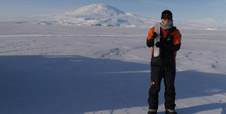Thursday 7 April 2016 12:44pm

In his element ... Mount Erebus provides the backdrop to ice core sampling during Otago Physics Master's student Andrew Pauling’s trip to the Antarctic, which was funded by a $10,000 Kelly Tarlton’s Antarctic Scholarship.
The climate modelling systems needed to create sound predictions about climate change are crucially in need of improvement, particularly for Antarctica and the Southern Ocean, Otago Physics Masters student Andrew Pauling says.
When Andrew won a $10,000 Kelly Tarlton’s Antarctic Scholarship - through Antarctica New Zealand’s Postgraduate Research Scholarships Programme - it supported his work on ice-ocean interactions in an Earth System Model, a type of climate model used for understanding the Earth’s past and present climate, and making predictions.
“Specifically, I am investigating the effect of Antarctic ice melt on Southern Ocean sea ice, as presently Earth System Models do a poor job of reproducing sea ice observations.
“Ultimately, my work aims to address a major deficiency in climate models, which are our best tool for making predictions about future climate. Our ability to predict what will happen accurately is crucial for making decisions about dealing with climate change.”
Andrew says modern climate models are some of the most advanced so far.
His interest in using modelling for predictions was encouraged when he landed a 2013-2014 summer studentship working with Dr Inga Smith from Otago’s physics department and Professor Cecilia Bitz from the University of Washington Atmospheric Sciences, who was visiting Otago as a Fulbright Senior Scholar.*
“It was my chance to begin learning how one of these models works and runs. I then wanted to continue working on understanding problems in the models which need to be fixed to make sensible predictions about the future.”
Andrew’s scholarship also included a trip to Antarctica as a field assistant to the K131 event/project, based around observations of Antarctic sea ice in McMurdo Sound.
His paper, The Response of the Southern Ocean and Antarctic Sea Ice to Fresh Water from Ice Shelves in an Earth System Model, combines Andrew’s Honours project work with research by Professor Bitz and was published in the March 2016 Journal of Climate.
Andrew also attended the American Geophysical Union Fall Meeting in San Francisco last year and presented results from the paper as a poster.
“It was a great opportunity to publicise our work at one of the largest conferences in the world (with about 24,000 attendees)”.
The trip was partly-funded by a University of Otago Polar Environments Research Theme travel grant, with the rest from Professor Pat Langhorne.
He has also provided Andrew with the equivalent of a Masters scholarship, and paid him while writing the paper before he starting his Master of Science.
Andrew says he is extremely grateful: “My supervisors have all been fantastic throughout my Masters.”
*Professor Bitz went on to become one of Andrew’s Honours and Masters supervisors, along with Dr Smith and Professor Langhorne.
